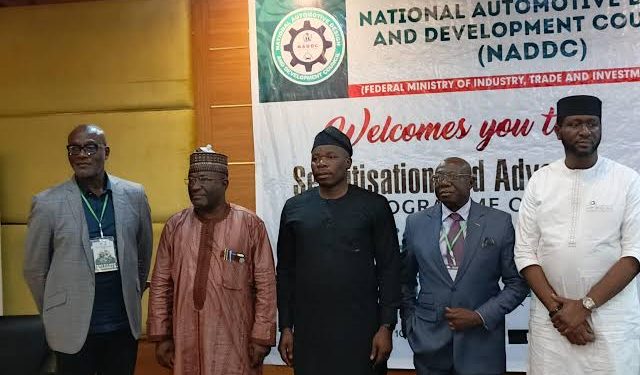The Federal Government will begin full enforcement of the End-of-Life Vehicle (ELV) Waste Recycling Regulation in October 2025, as it moves to establish a nationwide system for dismantling and recycling obsolete vehicles. The initiative is projected to generate over N60 billion annually and create more than 40,000 jobs across Nigeria.
The Director-General of the National Automotive Design and Development Council (NADDC), Joseph Osanipin, announced the timeline during a stakeholder sensitisation event in Abuja. He described the ELV regulation as a major step in Nigeria’s shift towards green industrialisation and a circular economy, transforming derelict vehicles from environmental hazards into economic assets.
“This is not a symbolic regulation,” Osanipin said. “It is a systemic economic and ecological intervention that will reposition Nigeria’s automotive ecosystem. We are setting up a framework that creates green jobs, attracts local investment, generates sub-national revenue, and reduces urban pollution.”
Introduced in March 2025, the ELV Waste Recycling Regulation mandates the proper identification, deregistration, dismantling, and environmentally responsible disposal of aging and non-functional vehicles. It also sets national standards for processing and recovering reusable materials and mandates certification for ELV operations.
Osanipin emphasised that the regulation goes beyond vehicle disposal, aiming to build a formal circular economy within the automotive sector. By shifting from informal and hazardous scrap practices to a structured recycling system, Nigeria can unlock a broad value chain from vehicle collection to material recovery while stimulating industrial growth.
To support nationwide implementation, a multi-agency ELV Steering Committee will be established, with representatives from the Federal Inland Revenue Service (FIRS), State Internal Revenue Services, Vehicle Inspection Offices (VIO), the Federal Road Safety Corps (FRSC), Nigeria Customs Service, Nigeria Police, and key players in the private recycling sector.
The committee will oversee implementation, ensure regulatory compliance, manage inter-agency coordination, and propose policy adjustments where necessary.
In addition to enforcing the regulation, NADDC is collaborating with the Joint Tax Board and state tax agencies to introduce fiscal incentives. These incentives will encourage voluntary retirement of old vehicles and promote responsible recycling practices, while enhancing revenue collection from ELV operations.
According to Osanipin, the ELV policy is expected to impact several sectors including automotive services, logistics, inspection, and materials recovery. It is designed to boost employment and attract private investment in Nigeria’s emerging recycling infrastructure.
He said the policy aligns with broader goals to transition to a sustainable, innovation-driven economy, positioning Nigeria as a regional leader in automotive recycling and green industry development.










